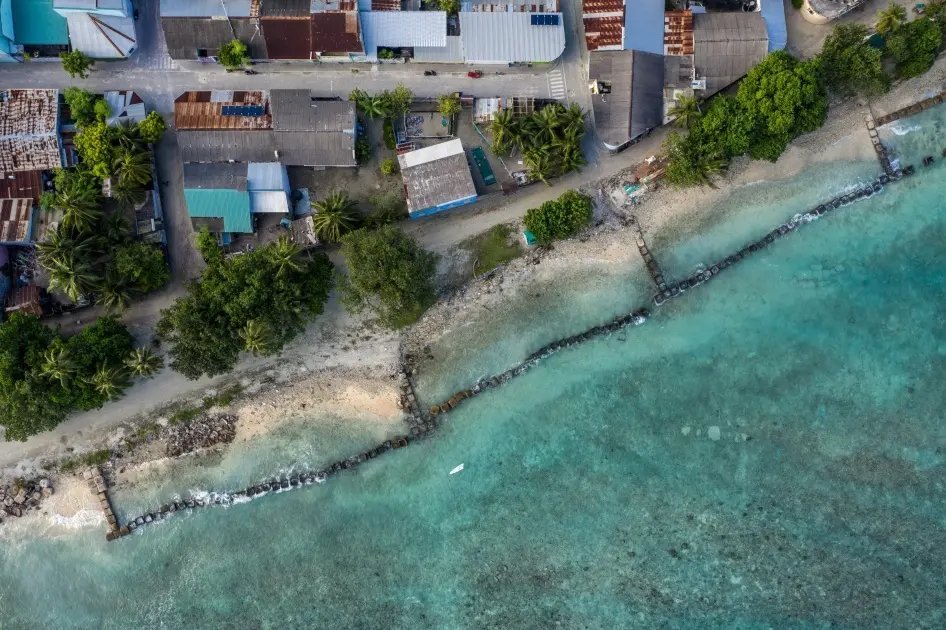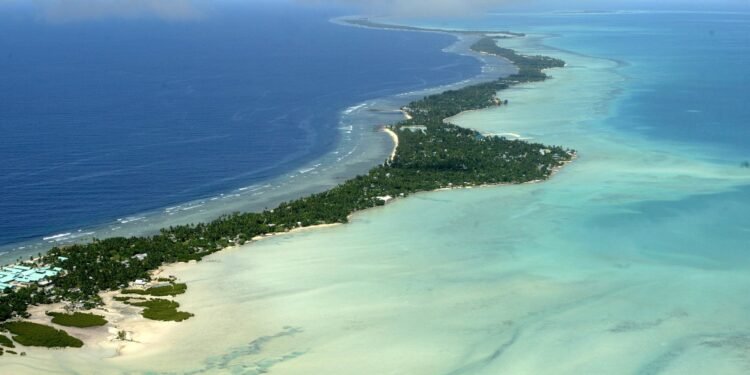MALE, MALDIVES: The Maldives is often imagined as a dream—a constellation of islands where turquoise waters kiss sunlit shores and time slows under palm shadows. For most, that beauty is enough. It draws travelers, inspires postcards, and comforts the weary imagination. But when one walks the sands not as a visitor but as a witness, another reality unfolds. It is not the ocean’s call that greets you first. It is the call of the minarets—soft, resonant, unwavering—moving with the breeze and echoing off the sea.
This is no accident. The Maldives is more than beauty. It is belief.
There is a quiet sanctity here, stitched into the rhythm of island life. From the coral mosques of Malé to the whispered prayers of fishermen at dawn, Islam is not a separate layer atop society—it is its pulse. Since 1153 CE, when King Dhovemi embraced Islam and became Sultan Muhammad al-Adil, the nation has remained anchored in the Shafi’i tradition. Faith is not merely practiced here. It is lived through coral stone, Quranic verse, and the humility of a people who see their land as divine trust.
Step into the Friday Mosque—Hukuru Miskiy—and you step into a breathing archive of sacred history. The Arabic calligraphy carved into coral, the lacquered woodwork that glows under soft light, the stillness that envelops you—it’s not architecture. It’s a spiritual geography. A memory of belief inscribed into matter.
But now, the very sea that has cradled this heritage threatens to consume it.
Climate change is not a future possibility for the Maldives. It is a daily truth. The nation sits, on average, just 1.5 meters above sea level. Rising seas, intensified storms, saltwater intrusion, and coral bleaching are not abstract consequences—they are existential threats. What’s at risk is not just land, but a way of life, a centuries-old culture, and the prayers of generations that rose with the tide.
And yet, despite its fragility, the Maldives is not a victim waiting to be rescued. It is a voice rising with moral clarity, a nation refusing to drown in silence. The world may see it as small, but in the arena of global conscience, it stands tall.
Successive governments in Malé have acted with rare resolve. In 2009, the world watched in awe as President Mohamed Nasheed and his cabinet held an underwater meeting to broadcast the urgency of climate action. But that moment was no spectacle. It was a signal.
Since then, the Maldives has declared a climate emergency, implemented a comprehensive Climate Change Policy Framework, and committed to achieving net-zero emissions by 2030—despite its heavy reliance on imported diesel. This is not just policy. It is principled leadership. While high-emission nations stall, the Maldives acts. Solar energy is being scaled across the islands. Waste-to-energy plants are under construction. Coral restoration projects and coastal fortifications are underway. Children grow up learning about both Sharia and sea-level rise. Faith and science walk hand in hand here.

And yet, the ocean keeps rising.
Which brings us to a far more uncomfortable truth—one not about the Maldives, but about the world.
The question is no longer whether the Maldives is doing enough. The question is whether the rest of the world, especially the Global North, is doing anything meaningful at all.
As COP30 approaches in Brazil, the Maldives is preparing to make its most morally charged case yet. It will not appeal for pity. It will call for justice.
Its expected demands are clear:
First, the Maldives seeks the operationalization of the Loss and Damage Fund—not as a symbolic gesture, but as a legal and financial obligation of those whose emissions built the modern economy. This is not aid. It is accountability.
Second, it will push for international recognition of climate-induced displacement under refugee and human rights law. Rising seas will soon force people to move. The Maldives demands that such movement be dignified, legal, and rooted in sovereignty—not statelessness.
Third, the Maldives will make a spiritual argument rarely heard in policy rooms. In the Islamic tradition, the Earth is not property—it is a trust (amana) from the Creator. Human beings are stewards (khalifa) charged with its protection. Climate degradation is not just ecological collapse. It is a betrayal of divine responsibility. In bringing this moral vision to COP30, the Maldives hopes to awaken not only new policies but new consciousness.
And so we ask the world’s leaders:
- Will you continue to debate emissions curves while nations vanish from the map?
- Will you craft climate finance schemes that protect your own economies but ignore the survival needs of nations like the Maldives?
- Will you allow climate-induced migration to unfold without law, dignity, or sovereignty?
- And above all, will you recognize that climate change is not simply a technological problem—but a moral crisis?
The Maldives does not come to COP30 as a supplicant. It comes as a mirror. What the world sees in that mirror is not a sinking island, but its own failure to act—its addiction to delay, its cowardice dressed as caution, its diplomacy of postponement. Every grain of sand lost to the sea is an indictment not of the Maldives, but of the world order.
And yet, the islands endure. Even as the tide creeps forward, prayers continue. Even as coral dies, solar panels hum with life. Even as the international community drags its feet, the Maldives stands on principle, rooted in a faith that has survived centuries of ocean winds and foreign powers. The same minarets that once welcomed the first rays of Islam now issue a global call to conscience.
This is no longer about environmentalism. It is about ethics. About whether the world values its smallest members, not just in ceremony but in policy. About whether leadership is defined by GDP or by moral courage. About whether the future will be built on equity or erasure.
To let the Maldives drown would not just be a failure of adaptation. It would be a failure of imagination. A refusal to listen to the quiet voices before they fall silent. A global sin of omission.
But the Maldives still speaks.
In its mosques and its ministries, in its corals and its classrooms, in its tides and its treaties—it speaks. The world would do well to listen. Because when the smallest nations rise in moral stature, the world order is reminded of something it too often forgets:
That justice is not measured in megawatts, but in memory. That survival is not a privilege, but a right. And that belief, when anchored in dignity and action, can move even oceans. The question is no longer what the Maldives must do.
The question is: Will the world rise before the sea does?
– Dr. Shahid Siddiqui; Follow via X @shahidsiddiqui
WATCH, LIKE, SHARE & SUBSCRIBE FOR MORE SPECIAL VIDEO STORIES/INTERVIEWS;



















